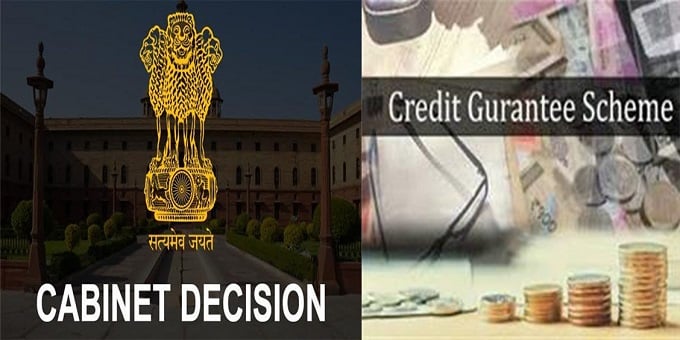The Cabinet Committee on Economic Affairs (CCEA) Chaired by the Prime Minister Shri Narendra Modi has approved the following proposals on December 11, 2019. The approvals in detail are as follows: Cabinet approved “Partial Credit Guarantee Scheme” for purchase of high-rated pooled assets:
Cabinet approved “Partial Credit Guarantee Scheme” for purchase of high-rated pooled assets:
The CCEA has approved the “Partial Credit Guarantee Scheme”, which will be offered by the Government of India (Gol) to Public Sector Banks (PSBs). The scheme will allow purchasing of high-rated pooled assets from financially sound Non-Banking Financial Companies (NBFCs) / Housing Finance Companies (HFCs) amounting to a total of Rs 1 lakh crore. The scheme was announced in the Union Budget of 2019-20.
- Credit Guarantee limit: The amount of overall guarantee is limited to first loss of up to 10% of the fair value of assets being purchased by the banks under the scheme, or Rs 10,000 crore, whichever is lower, as agreed by the department of economic affairs (DEA).
Key Points:
i.Scheme Coverage: The scheme would cover NBFCs / HFCs that may have slipped into SMA-0 (Special Mention Account-0) category during the one-year period prior to 1.8.2018, and asset pools rated “BBB+” or higher.
- NBFCs / HFCs reported under SMA-I and SMA-2 category during the aforesaid period will be ineligible under the Scheme.
ii.One-time partial credit guarantee offered: The one-time partial credit guarantee offered by Gol will be available till 30th June, 2020 or till when Rs. 1,00,000 crore assets get purchased by the Banks, whichever is earlier.
- Offer extension: The finance ministry has the power to extend the validity of the Scheme by up to 3 months based on its progress.
iii.Benefit of the scheme: The scheme would help address NBFCs/HFCs to resolve their temporary liquidity or cash flow mismatch issues, and also enable them to enhance their operation thereby improving the economic growth.
Cabinet approved the proposal for increase in authorised capital and equity support to IIFCL:
The CCEA has approved the proposal to increase the authorised capital and equity support to India Infrastructure Finance Company Limited (IIFCL).
- Equity support: The cabinet approved to provide additional equity support of Rs. 5,300 crores in FY20 (Financial Year 2019-20) and Rs. 10,000 crores in FY21.
- Authorised capital: The Cabinet has also approved to increase the authorized capital of IIFCL from Rs. 6,000 crores to Rs. 25,000 crores.
Key Points:
i.The equity support will be provided through Budgetary support or through issuance of recapitalization bonds. DEA will decide the timing, terms and conditions.
ii.Benefit to IIFCL: The IIFCL with this approval can now enhance its financial infrastructure projects in line with Government of India’s target to invest Rs. 100 lakh crore in infrastructure sector over the next 5 years.
iii.IIFCL: The IIFCL which is an NBFC, was set up in January 5, 2006 and is 100% owned by govt. of India. It is registered with the Reserve Bank of India(RBI) since 2013.
- Current authorised & paidup capital: The authorised capital and the paid up capital of the company currently stands at Rs. 6000 crores and Rs. 4702.32 crore respectively.
Cabinet authorised NHAI to set up Infrastructure Investment Trust and monetize National Highway projects:
The CCEA approved the Ministry of Road Transport and Highways (MoRT&H) proposal to authorize National Highways Authority of India(NHAI) to set up Infrastructure Investment Trust (InvIT). The InvIT will be based on the InvIT guidelines issued by SEBI (Securities and Exchange Board of India). It will provide flexibility to investors.
Key Points:
i.With this approval, NHAI will be able to monetize the completed National Highways(NH) which has at least 1-year toll collection record. NHAI will also have the power to levy toll on the identified highway.
ii.InvIT establishment: InvIT will be a Trust established by NHAI under the Indian Trust Act, 1882 and Securities and Exchange Board of India (Infrastructure Investment Trusts) Regulations, 2014. It may hold assets either directly or through an SPV or a holding.
iii.Benefits of InvIT: Some of the benefits of InvIT are:
- Generation of specialized O&M (Operation and Maintenance) Concessionaires.
- Attract investments as it would provide long-term stable returns.
iv.Reason for creating InvIT: In October 2017, the Indian govt. launched Bharatmala Pariyojana, which is a flagship highway development programme for development of 24,800 km of roads with a total investment of Rs. 5,35,000 crores.
- NHAI needed more funds to complete the project within the timelines. Thus, it was required to monetize the completed and operational NH assets to unlock their value and offer attractive schemes to private investors to invest in construction of highways.
- It was during the Budget Speech of 2018-19, where it was stated that NHAI should organise its Special Purpose Vehicles (SPV) and use innovative monetizing structures such as Toll, Operate and Transfer model and InvITs.
Cabinet approved Insolvency and Bankruptcy Code (Second Amendment) Bill, 2019:
The CCEA approved Insolvency and Bankruptcy Code (Second Amendment) Bill, 2019. This bill will amend the Insolvency and Bankruptcy Code, 2016 (code). The aim of the amendment is to remove certain difficulties that are faced during insolvency resolution process to realise the objects of the code and to further ease doing of business.
Key Points:
i.Sections to be amended: The bill seeks to amend sections 5(12), 5(15), 7, 11, 14, 16(1), 21(2), 23(1), 29A, 227, 239, 240 and insert new section 32A in the Insolvency and Bankruptcy Code, 2016 (Code).
ii.Benefit: The amendment will boost investment in financially distressed sectors.
Cabinet approves Aircraft (Amendment) Bill, 2019:
The CCEA approved to introduce the Aircraft (Amendment) Bill, 2019. The bill would make amendments to the Aircraft Act, 1934 (XXII of 1934). It will now be introduced in the parliament. The Bill enhances the maximum limit of fine from the existing Rs. 10 lakhs to Rs. 1 Crore. Requirements of the International Civil Aviation Organisation (ICAO) will be fulfilled by the amendment.
Key points:
i.The bill will enlarge the scope of the existing cct to include regulation of all areas of air navigation.
ii.The 3 regulatory bodies of Indian civil aviation sector namely Directorate General of Civil Aviation(DGCA), Bureau of Civil Aviation Security(BCAS) and Aircraft Accident Investigation Bureau(AAIB) will become more effective through the bill, thus leading to enhancement in the level of safety and security of aircraft operations in the country
Cabinet approved revision in the Funding Pattern of Delhi Metro’s three Priority Corridors of Phase – IV:
The CCEA approved for revision in the funding pattern of three approved priority corridors of Delhi Metro Phase-IV projects. The 3 priority corridor projects of Delhi are (i) Aerocity to Tughlakabad, (ii) Ramakrishna Ashram to Janakpuri (West) & (iii) Mukundpur – Maujpur.
Funding ratio: The land cost of funding will be in the ratio 50:50 between Government of India (GoI) and Government of National Capital Territory of Delhi (GNCTD).
Key Points:
i.This is in accordance with the amendments to Metro Rail Policy, 2017 applicable only for Delhi.
ii.Project cost: The cost of the project remained unchanged at Rs. 24,948.65 crores.
iii.Contribution by GoI: GoI contribution increased from the existing Rs. 4,154.20 crores to Rs. 4,643.638 crores.
iv.Fund Revision Background: The project was approved in March 2019. But in April, 2019, GNCTD directed DMRC not to start work on the sanctioned corridors unless MoHUA (Ministry of Housing and Urban Affairs) revises the cost sharing pattern in tune with approval concurred by them.
Cabinet approved revision of PM’s Development Package for Horticulture in UTs of J&K and Ladakh:
The CCEA has approved for the revision/ re-appropriation of approved components of Prime Minister’s Development Package (PMDP) for development of Horticulture in the Union Territories(UTs) of Jammu & Kashmir(J&K) and Ladakh under Mission for Integrated Development of Horticulture (MIDH). It also approved for extension of the implementation of PMDP approved in 2016 beyond 31st March 2019 by 3 years, ie.,upto March 31, 2022.
Key Points:
Following approvals were made:
i.Provision of further extension of implementation of PMDP by a maximum period of 12 months, if required, was approved.
ii.Revision/Re-appropriation of earlier approved components of PMDP within the approved outlay of Rs. 500 crores.
iii.Unspent amount of Rs. 59.07 crore remaining with undivided State of Jammu & Kashmir including Ladakh has to be revalidated. Click here to know more.
About Union Cabinet:
The Union cabinet exercises the executive authority in India. The senior minister in the cabinet are called as cabinet ministers, junior minister as minister of state and rarely deputy ministers. The cabinet is led by the Prime Minister.





